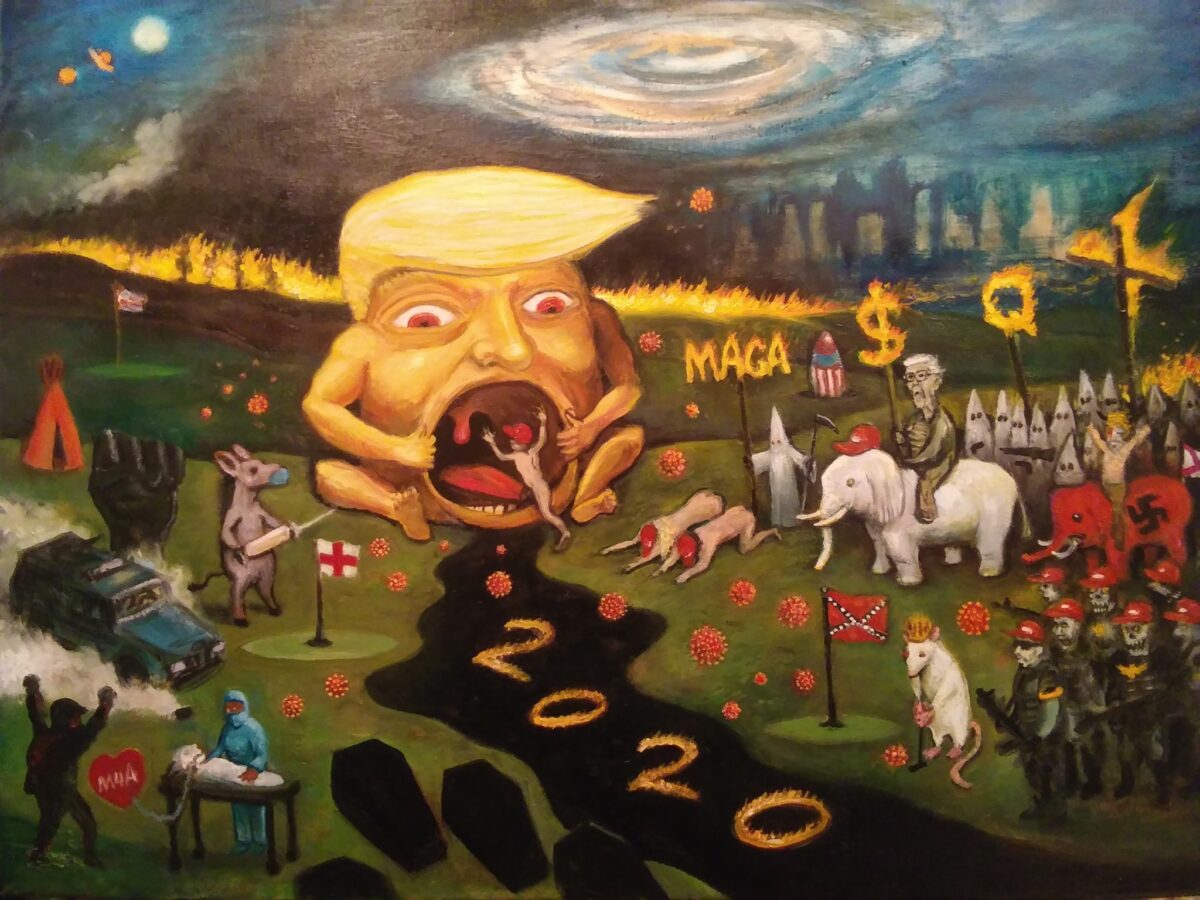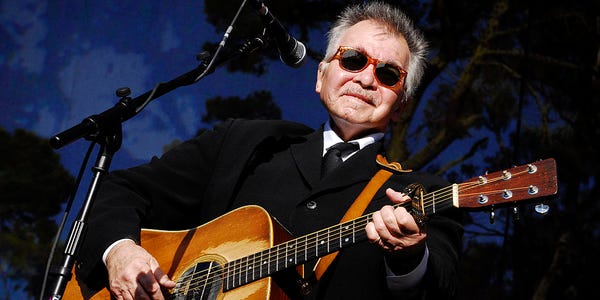
Hellscape 2020: Oil on Canvas, 18 X 24 – A New American Journal graphic by Walter Simon [Art Market Place]
By Glynn Wilson –
A half a million dead.
So far, more Americans perished from COVID-19 than on all the battlefields of World War I, World War II and the Vietnam War combined. And before it’s all over, maybe near the end of summer, the number will most likely surpass the number of dead in the Civil War.
We lost 405,399 in WWII, 282,000 in Vietnam, and 116,516 in WWI (half to combat, half to the influenza epidemic of 1918). At least 620,000 died on both sides in the Civll War, about the number we are projected to lose by the end of the summer of 2021.
As of Monday morning, February 22, 511,322 people have died in the United States from COVID, far more than any other country in the world, where 2,480,543 have succumbed.
Only 246,560 died in Brazil, and 156,470 are reported dead in India, a third world developing country with very little in the way of sanitary sewer systems where cows are allowed to roam the streets and people bathe in rivers where they dump their feces and animal waste.
Reported Cases and Deaths by Country or Territory
This is a national disgrace, in a country that is supposed to lead the world in science and health technology.
Much of it can be chalked up to a corrupt administration where science was treated as a “hoax” and corruption charges called a “witch hunt,” as if we were back in the 18th century when midwives were burned at the stake.
But according to The New York Times at least, we are turning the corner on the coronavirus, since here were only 56,159 people hospitalized as of Feb. 21, according to the Covid Tracking Project, the lowest number since Nov. 7.
“While deaths remain high, because it can take weeks for patients to die from Covid-19, the number of U.S. hospitalizations has steadily and rapidly declined since mid-January, when the seven-day average reached about 130,000,” according to a New York Times database. “Experts attributed that peak to crowds gathering indoors in colder weather, especially during the holidays, when more people traveled than at any other time during the pandemic.”
In Vietnam, by contrast, only 35 people died, and only 300 died in Cuba. In China, the country where the virus originated from the unsanity sewers, out houses, holding ponds full of animal waste and human RNA and wet markets, only 4,636 died. In Venezuela, a country often derided by Trump, only 1,316 died out of 136,068 people who tested positive.
Numbed by Loss
We are a nation numbed by misery, loss and burnout, exhausted after four years of endless, shameless racism and narcissism on display on a daily basis on TV and social media from the highest levels of our government in the White House itself.
Yet, as the Times points out, “new virus cases are down sharply, deaths are slowing and vaccines are steadily being administered. But there is concern about emerging variants of the virus, and it may be months before the pandemic is contained.”
Each death left untold numbers of mourners in every corner of the country, from big cities to small towns, leaving empty spaces in communities across America. As President Joe Biden liked to say in the campaign to overcome Trump, empty chairs at the kitchen table.
Significant artists and musicians are gone forever, national treasures like American folk singer-songwriter John Prine, who died of complications related to coronavirus on April 7 at age 73. And Ellis Marsalis Jr., a New Orleans pianist who led a late 20th-century revival in jazz music, died of health complications related to the coronavirus at 85 on April 1.

National treasure American folk singer-songwriter John Prine, who died of complications related to coronavirus on April 7 at age 73: Google
Related: If Coronavirus Takes Me, You Can Bury Me On Lookout Mountain
We have all lost friends and family members, many of them anonymous in places like the Ninth Ward in New Orleans or the Black Belt in Alabama, where the deaths of poor African Americans were probably never diagnosed or counted at all.
Statisticians say one in 670 Americans died in the past year of COVID. How many of those could have been prevented, if only we had a national strategy, instead of denial from the top down?
In New York City, more than 28,000 people died of the virus, one in 295 people. In Los Angeles County, which has lost nearly 20,000 people to Covid-19, about one in 500 people died.
Experts have pointed to a variety of explanations for why the country’s coronavirus metrics have been improving over the past few months, the Times reports: more widespread mask use and social distancing after people saw friends and relatives die, better knowledge about which restrictions work, more effective public health messaging, and, more recently, a growing number of people who have been vaccinated. The most vulnerable, like residents of nursing homes and other elderly people, were among the first to receive the vaccine.
“While scientists hope the worst is behind us, some warn of another spike in cases in the coming weeks, or a ‘fourth wave,’ if people become complacent about masks and distancing, states lift restrictions too quickly or the more contagious variants become dominant and are able to evade vaccines.”
One year ago, as the coronavirus took hold in the United States, few public-health experts predicted its death toll would climb to such a horrible height.
Related: Coronavirus Hits Gulf Coast Just In Time for Spring Break
At a White House briefing on March 31, Dr. Anthony S. Fauci, the top infectious-disease expert in the country, and Dr. Deborah L. Birx, who was coordinating the coronavirus response at the time, announced a stunning projection: Even with strict stay-at-home orders, the virus might kill as many as 240,000 Americans.
“As sobering a number as that is, we should be prepared for it,” Dr. Fauci said at the time.
Less than a year later, the virus has killed more than twice that number, the Times points out.
Yes, the virus has disproportionately caused the deaths of older Americans in nursing homes and other long-term care facilities, where infections spread easily among vulnerable residents: They account for more than 163,000 deaths, about one-third of the country’s total, and was especially lethal to Americans 65 and older, who account for about 81 percent of the country’s Covid-19 deaths.
The feeling of loss throughout the United States goes beyond physical spaces.
“People are feeling a psychological and spiritual void,” said Paddy Lynch, a funeral director in Michigan who has worked with families who have lost relatives to the coronavirus.
Part of that void, he said, comes from the missing rituals, the lack of a communal catharsis after a death.
By comparison, the 1918 influenza pandemic is estimated to have killed about 675,000 Americans, according to the Centers for Disease Control and Prevention, when the country’s population was a third of what it is now. But it also happened at a time when influenza vaccines, antibiotics, mechanical ventilation and other medical tools did not exist at all.
Drew Gilpin Faust, a historian and former president of Harvard University, said medical and societal achievements in the United States had caused many Americans to believe that “we were ready for anything — that we had conquered nature.”
“When there were field hospitals in Central Park, and bodies piled up because there was no capacity to bury them, we were just so shocked at ourselves and had not thought this would ever happen to us,” said Dr. Faust, whose book This Republic of Suffering explores how Americans grappled with death after the Civil War. “That sense of mastery over nature has been so seriously challenged by this pandemic.”
Deaths from Covid-19 in the United States came faster as the pandemic went on. The first known death occurred in February, and by May 27, 100,000 people had died. It took four months for the nation to log another 100,000 deaths; the next, about three months; the next, just five weeks.
Though daily deaths are now slowing, about 1,900 deaths in America are being reported each day.
Monday, Feb. 22, 500,000 Dead
“This will be a sad day in our history,” said Dr. Ali Mokdad, an epidemiologist at the University of Washington. “Our grandchildren and future generations will look back at us and blame us for the biggest failure in facing a pandemic, in the country that’s the richest country in the world. That we allowed people to die, that we didn’t protect our vulnerable populations — Native American, Hispanic and African-Americans. That we did not protect our essential workers.”
It will still take months to vaccinate the American public, and new, more contagious variants of the virus could quickly undo the nation’s progress and lead to another spike.
The Institute for Health Metrics and Evaluation, an independent global health research center at the University of Washington, has projected that the nation could reach more than 614,000 deaths by June 1. Factors like how well people adhere to guidelines like mask-wearing and social distancing, plus the speed of vaccinations, could affect that estimate.
How will we ever heal and recover psychologically from this disaster? Will there be enough time before the next one hits?
Experts agree this will not be the last deadly virus we will face on a global scale, on top of all the climate change related disasters that are in store — even if we drastically changed our lifestyles now and began to grapple with the inevitable change that must come about to prevent some of them.
Just because Trump is out of the White House, for now, does not totally get us off the hook. We must get to work. Clearly there is no heavenly savior to save us from ourselves. Only we can do that.













